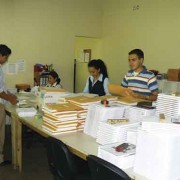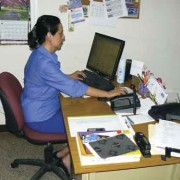A School without a Soccer Field
Guatemala is the first hispanic nation to produce a homeschooling curriculum
photos: Ángel Moscoso
In 1999, Marvin Byers had a millennial vision for something unprecedented. Guatemala City’s mammoth Hebrón Church, where Byers still pastors, had for decades boasted a school for parishioners and for anyone else who could come —and for some who could not. Some of Guatemala’s poorest children attended on scholarship and went on to cheat poverty.
In his vision, Byers saw the lights go out in the school’s 20-odd classrooms. The desks disappeared; the doors were double-locked; and the chatter ceased. But the school did not die. In fact, it grew. And it underwent a transformation apparently without precedent. Simply put, the entire Colegio Hebrón school “went home” and never came back.
By 1990, North America had become the international hotbed for homeschooling. The phenomenon exists there to a degree unapproached elsewhere but Australia. About 1.7 million American and Canadian children are now homeschooled, even though the practice remains controversial and, in certain jurisdictions, quasi-legal.
In Guatemala, it is not only legal and free of controversy, but government-approved. In 1999, Hebrón launched the first total transformation of a traditional institution into a homeschooling one. The major North American homeschooling institutions, like Calvert and A Beka, did not begin as traditional schools, or they remain schools that include campuses.
“We know of no other colegio anywhere,” says Josefina de Machado, Colegio Hebrón’s headmistress, “that effected the complete metamorphosis.” (A colegio is not a college but a private school.)
What is even more certain, according to curriculum coordinator Ángela de Barahona, is that Colegio Hebrón is the first complete homeschooling program in Spanish. Partial curricula have appeared in Chile and Colombia, but only Hebrón covers the full 12-year run of childhood education, plus preschool, and every subject recognized by national education ministries.
The name of the curriculum (and of the church) has significance for education, say the Barahonas. Hebrón is a city in Judea, part of what is also called the West Bank. Three thousand years ago, according to Samuel, it was the temporary capital of Israel. King David, the story goes, reigned there seven years before conquering the citadel of Jebus and renaming it Jerusalem, from which he reigned another 33 years.
Juan Carlos Barahona, Ángela’s son and right-hand man in curriculum development, explains that in Hebrón, “the young king prepared himself for the rest of his reign. We want to be ‘Hebrón’ for our students, so they can capture their own Jerusalems and ‘reign well’ afterwards. To be productive, to be forces for good.”
Families need not enroll in every subject. Secular and Catholic families who are sold on Hebron’s academic merits, but not on its Protestant bias, may exclude the curriculum’s religious portion. English-speaking families may opt out of the English component.
In 2001, Guatemala’s Education Ministry granted status as an experimental school to Colegio Hebrón. In 2004, Hebrón won official accreditation after meeting a long list of requisitos. Most of these were academic standards, says headmistress De Machado. But she believes that Hebrón scholars enjoy other advantages.
“They’re free of peer pressure, which is the downfall of so many kids, even bright ones.” She asserts that the nonacademic lessons are even more important than the scholarly element.
“We’ve seen children come of age under the program,” Ángela de Barahona says. “And we note no generation gap between these children and their parents. They understand each other completely. There is mutual respect and closeness.”
Hebrón laureate Alejandra Ligoria, 20, was among the first to complete the secondary courses. She only wishes that the program had been in place for her primary years.
“I have a bond with my parents that would not otherwise exist,” she says. “And even though I was schooled at home, I didn’t miss out on anything. I had friends, mostly other homeschooled kids. And I had no problem with my parents having a say in who they were. ”
“It was good,” she adds, “for the other teacher/parents, too. My mom even says that Hebrón was more for her than it was for me.”
Alejandra’s father, Rodolfo, acknowledged that “it was a hard decision to homeschool. It was an untried path, an adventure, and the children’s future was at stake. But we chose well.”
Alejandra’s mother, Brenda, praises the program for the time it saves everyone. “My children have extra hours, every day, to pursue sports, music lessons, hobbies. Alone or with friends. And teaching them to read made me feel like the most important person on Earth.”
“My mom is my best friend,” Alejandra agrees. Her sister Mariana, 11, and brother Gabriel, 9, are consequently enrolled. This time Rodolfo has no doubts.
Though parents must commit to a routine, they are limited in the work they must do. The curriculum is a turnkey proposition, such that ordinary students spend four hours daily in studies, with parents monitoring and helping. The books, clearly written and full of whimsical artwork, are available in color or, for families of limited means, black and white. Instead of lesson plans, there are workbooks and outlines; quizzes are also provided. Every two months, students must attend periodic examinations in any of several locations, including Totonicapán.
De Machado says that Hebrón is currently transitioning to a system that is even more hands-off for parents.
“We’re going digital. We’re putting lessons on DVD, to complement and further empower students and parents.” The DVDs parallel the written portion. At this writing, they are available for preschool through third grade.
“But we add a grade each year,” De Machado says. Ultimately, there will be DVDs even for high school chemistry. The recording is done at Hebrón’s Zone 13 campus.
She tells of one mother who had very little schooling herself. “She’s finishing her education—alongside her son. She’s taking the exams and earning her own diploma with our program.”
Over 800 Guatemalan children are currently enrolled. Another 500, in places as remote as Puerto Rico and Argentina, are also matriculated. Claudia de Gálvez, a mother of three Guatemalan girls, is in her first year.
“My daughters are so happy,” she says. “Often, we make day trips around town to complement the book learning. The girls are getting the most out of life. And we share it all.”
Maritza Cabrera, another parent, notes that her son Esteban, 10, often did homework as late as 9 p.m. before his enrollment two years ago. He had been bullied at public school and had become taciturn and withdrawn. Now he practices swimming in the afternoons and aids his mother in the kitchen—another learning experience.
“He’s changed completely,” his mother says. “He’s happy and adores learning.”
Colegio Hebrón’s English website is www.ministerioshebron.com






Interested in homeschooling my 8 year old son.
please let me know how to get started. Thank you,Victoria
Yo estudie 6 años en el Colegio Hebron en mi casa… y puedo decirles que es una excelente educación, sale un muy preparado, en todo sentido!! es una gran bendición, y la mayor bendición es poder compartir mas tiempo con mi familia, mis hermanos, la verdad es que es muy corto el tiempo que pasamos con ellos al ir a un colegio, luego crecemos y ya no nos gusta estar con nuestra familia, pero el estudio en casa hace mas unida la relación entre padres y hermanos, ya que ellos llegan a ser tus compañeros, maestros y tus mejores amigos!! asi que Padres, no desperdicien la oportunidad que tienen de ver crecer a sus hijos y educarlos ustedes mismos, es muy corto el tiempo que tienen para aprovecharlos y amarlos ya que luego uno crece muy rapido y puede ser ya muy tarde para compartir con ellos la dicha de estar sus primeros años de sus vidas juntos, hasta que luego salgan ya de sus casas para formar un nuevo hogar.
Esto es de un hijo a un padre… creanme que sus hijos se los agradeceran y ustedes estaran contentos por eso. Alguien dijo una vez que los que mandan a sus hijos al colegio es porque no los quieren, y es muy cierto.. porque los niños pasan mas tiempo fuera de casa que con sus padres, y quienes los educan son maestros que muchas veces son desconocidos a los padres, asi que si tu amas a tus hijos, educalos tu mismo, en tu casa! y Colegio Hebron es una gran bendicion para aquellos que aman a sus hijos!!!!
Dios los bendiga. Jose